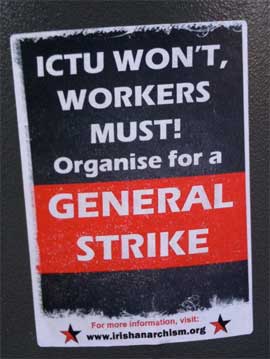Over 30 years of anarchist writing from Ireland listed under hundreds of topics
A general strike requires organisation not just rhetoric
 With the first massive union demonstrations against the cuts the WSM argued that only a general strike could force the government to stop targeting workers and the poor to pay for the crisis. Three years on it has become clear that such a strike will not materialize unless we rebuild mass participation at the base of the unions.
With the first massive union demonstrations against the cuts the WSM argued that only a general strike could force the government to stop targeting workers and the poor to pay for the crisis. Three years on it has become clear that such a strike will not materialize unless we rebuild mass participation at the base of the unions.
The one day public sector strike revealed just how weak our unions have become at the base. Almost none of us had been on strike and a culture had been allowed to develop in most unions where members are not expected to turn up to local meetings or AGM's unless they have a grievance. Although the organisation was often chaotic the public sector strike was just about pulled off but it was a one day symbolic action - to win we would need an indefinite strike that lasted until the government backed down. Could you organize your fellow workers in your branch to agree to, organize for and implement such a strike?
If our answer to this question is No then we must expect the ICTU to not only be willing to organize a real general strike but also to be capable of selling that to a membership who for the most part don't even attend demonstrations. Are any of us that daft?
The left has got good at winning positions in the unions, at getting bums on seats on section & branch committees. But this is no strategy without successfully mobilizing and engaging every union member in a process of organising real resistance to the cuts.
Our argument in brief is that the left needs to worry less about winning posts in unions and passing militant sounding motions and instead focus on the need to organize. Not just in the sense of organising those outside the unions but at least as importantly organising the mass of union members and engaging them in an ongoing series of assemblies in the workplace to discuss, agree and organize real resistance.
This is not an impossible task. There are recent examples of such successful drives in the US and elsewhere and even in Ireland it is very clear that some union branches in hte INTO for instance are very much more successful at consistently engaging and mobilizing their membership then what is average. We need to learn how that is done, modify it for out local circumstances and get to work. The crisis, it appears, is not going to go away anytime soon.

